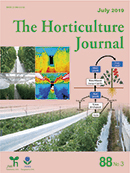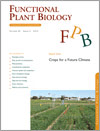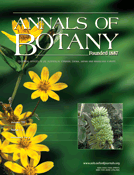
NEW PHYTOLOGIST
Scope & Guideline
Illuminating the Path of Plant Research
Introduction
Aims and Scopes
- Plant Physiology and Biochemistry:
This area encompasses studies on the physiological processes in plants, including photosynthesis, respiration, and nutrient uptake, as well as the biochemical pathways that support these functions. - Plant-Microbe Interactions:
Research in this scope investigates the relationships between plants and microbes, including beneficial associations such as mycorrhizae and harmful interactions with pathogens. - Ecophysiology and Adaptation:
This focuses on how plants adapt to their environments, particularly under stress conditions such as drought, salinity, and temperature extremes, and the physiological mechanisms behind these adaptations. - Genetics and Genomics:
Studies in this area include genetic mapping, gene editing technologies like CRISPR, and the genomic analysis of plant traits, particularly those related to stress resistance and agricultural improvement. - Evolutionary Biology and Phylogenetics:
This encompasses the evolutionary relationships among plant species and the genetic mechanisms driving speciation and adaptation in various environments. - Environmental Impact and Climate Change:
Research on how climate change affects plant growth, distribution, and ecological interactions, as well as the role of plants in carbon sequestration and ecosystem health.
Trending and Emerging
- Plant-Microbiome Interactions:
There is a growing body of research focused on the interactions between plants and their associated microbiomes, exploring how these relationships influence plant health and productivity. - CRISPR and Genome Editing Technologies:
The application of CRISPR and other genome editing tools is increasing, with studies focusing on gene function, crop improvement, and the understanding of genetic mechanisms underlying plant traits. - Functional Trait-Based Ecology:
Research is increasingly centered around understanding how specific plant traits influence ecosystem functions and resilience, particularly under changing environmental conditions. - Climate Resilience and Adaptation:
Studies focusing on how plants adapt to climate change and extreme weather events are trending, with an emphasis on physiological, morphological, and genetic adaptations. - Synthetic Biology Applications:
The integration of synthetic biology in plant research is on the rise, with innovative approaches being developed to enhance plant traits for agricultural and environmental benefits.
Declining or Waning
- Traditional Taxonomy:
Research focusing solely on the classification and naming of plants has diminished in favor of more integrative approaches that combine molecular, ecological, and evolutionary perspectives. - Conventional Breeding Techniques:
Interest in classical plant breeding methods has waned as genetic engineering and biotechnology, including CRISPR and other advanced techniques, gain prominence in improving crop traits. - Single-Factor Studies:
Research that examines the effects of single environmental factors (e.g., temperature or nutrient availability) in isolation is less common, as there is a growing recognition of the complexity of multi-factorial influences on plant systems. - Basic Morphological Studies:
There seems to be a reduced emphasis on purely descriptive studies of plant morphology, with a shift towards functional and ecological implications of morphological traits.
Similar Journals

Crop Journal
Bridging knowledge and innovation in crop research.Crop Journal (ISSN: 2095-5421; E-ISSN: 2214-5141) is a premier, open access journal published by KEAI PUBLISHING LTD, dedicated to advancing the fields of agronomy and plant science. Established in 2013, this journal has quickly established itself as a vital resource for researchers, professionals, and students, achieving a remarkable Q1 ranking in both Agronomy and Crop Science, as well as Plant Science. With an impressive position in the Scopus rankings—30th out of 516 in Plant Science and 25th out of 406 in Agronomy—it stands at the forefront of scholarly discourse, representing the latest innovations and research breakthroughs within the global agricultural community. The journal embraces a broad scope that encompasses all aspects of crop science, aiming to foster understanding and propel advancements in sustainable agricultural practices. Accessible from anywhere in the world, Crop Journal plays a crucial role in disseminating knowledge that addresses the challenges of food security and environmental sustainability, making it an indispensable tool for those invested in the future of our planet's agriculture.

Horticulture Journal
Innovating Sustainable Practices in Plant ScienceThe Horticulture Journal, published by the Japan Society for Horticultural Science, is a leading academic platform dedicated to the advancement of horticultural research and practices. With an ISSN of 2189-0102 and an E-ISSN of 2189-0110, this journal endeavors to publish high-quality research that emphasizes innovative techniques, sustainable practices, and the science of plant cultivation. The journal has been recognized for its impact within the field, currently holding a Q2 ranking in Horticulture and a Q3 ranking in Plant Science as of 2023, indicating its significant contribution to advancing knowledge. With its open-access model, researchers, professionals, and students have the opportunity to engage with the latest findings, thanks to the journal's commitment to widespread dissemination of information. Since its convergence period began in 2015 and continuing through to 2024, the Horticulture Journal remains instrumental in promoting sustainable and beneficial practices in horticulture science globally.

PROTOPLASMA
Pioneering Research that Shapes Biological UnderstandingPROTOPLASMA is a prestigious academic journal published by Springer Wien, dedicated to advancing knowledge in the fields of Cell Biology, Plant Science, and related areas of Medicine. Established in 1926 and continuing through 2024, this journal boasts a rich history of scholarly contributions and is currently indexed with a notable ranking in various disciplines: it stands in the top quartile (Q1) in Plant Science, the second quartile (Q2) in miscellaneous Medicine, and the third quartile (Q3) in Cell Biology as of 2023. With robust Scopus rankings placing it in the 86th percentile in Plant Science and a solid position in Cell Biology, PROTOPLASMA is recognized for its commitment to high-quality research and innovative findings. Although the journal does not offer open access options, it remains a valuable resource for researchers, professionals, and students seeking to explore the cellular and molecular underpinnings of plant life and its implications in broader biological contexts. Based in Austria, PROTOPLASMA serves as a vital forum for disseminating pioneering research that shapes the future of scientific inquiry in its respective fields.

FUNCTIONAL PLANT BIOLOGY
Pioneering Research in Agronomy and Crop ScienceFUNCTIONAL PLANT BIOLOGY is a prestigious academic journal published by CSIRO PUBLISHING, specializing in the dynamic fields of Agronomy and Crop Science as well as Plant Science. With an ISSN of 1445-4408 and an E-ISSN of 1445-4416, this journal provides a platform for innovative research that addresses key challenges in plant functional biology, ranging from genetics and physiology to ecological interactions. As evidenced by its impact factor and competitive rankings, including Q1 in Agronomy and Crop Science and Q2 in Plant Science, FUNCTIONAL PLANT BIOLOGY holds a significant place in the scientific community, ranking in the top tiers of Scopus for both categories. The journal supports open access options, ensuring that critical research is widely disseminated and accessible to researchers, professionals, and students around the globe. With a publication history spanning from 2002 to 2024, the journal continues to foster the advancement of plant science, making significant contributions to sustainable agricultural practices and ecological research in Australia and beyond.

PHOTOSYNTHETICA
Exploring the depths of photosynthesis and plant physiology.PHOTOSYNTHETICA is a prominent academic journal published by the Academy of Sciences of the Czech Republic, Institute of Experimental Botany, dedicated to advancing the field of plant science and physiology. Established in 1979, this open-access journal has been a vital platform for high-quality research and critical discussions within the scientific community, with its current impact factor reflecting its significance—ranking in the third quartile in Physiology and the second quartile in Plant Science as of 2023. With an impressive Scopus ranking (#96/516) in Plant Science and an 81st percentile standing, PHOTOSYNTHETICA showcases innovative research trends and methodologies vital for understanding photosynthetic processes and plant biology. The journal's open-access policy, initiated in 2019, ensures that valuable findings are readily available to researchers, professionals, and students globally, fostering collaboration and knowledge exchange. Set in the heart of Europe, this journal continues to be a cornerstone for experts dedicated to exploring the complexities of plant systems and their physiological responses.

Rice
Empowering agricultural innovation through open access research.Rice, an esteemed journal published by Springer, is at the forefront of scientific research in the fields of Agronomy, Plant Science, and Soil Science. With its ISSN 1939-8425 and E-ISSN 1939-8433, the journal offers open access since 2012, ensuring that vital research findings are widely accessible to researchers, professionals, and students globally. Based in the United States, the journal has established itself as a pivotal resource, reflected in its impressive rankings—Q1 across multiple categories in 2023, including Agronomy, Plant Science, and Soil Science. With Scopus rankings positioning it in the top tiers of agricultural and biological sciences, Rice continues to foster innovative dialogue and advances in agricultural research. The journal's objectives focus on disseminating high-quality research that contributes significantly to the understanding and sustainable management of rice production, supporting global food security and agricultural practices. Researchers in this domain will find Rice to be an invaluable resource for cutting-edge findings and collaborative opportunities.

Annual Review of Plant Biology
Elevating Understanding of Plant Biology TrendsThe Annual Review of Plant Biology, published by Annual Reviews, stands as a premier academic journal dedicated to the comprehensive coverage of significant developments in the field of plant biology. With an impactful presence in the United States and a stellar reputation reflected in its Q1 rankings across multiple categories including Cell Biology, Molecular Biology, Physiology, and Plant Science, this journal consistently ranks among the top within its domain. The journal is particularly esteemed for its synthesis of the latest research findings, making it an invaluable resource for researchers, professionals, and students seeking in-depth insights and advancements in plant biology. Though it does not offer open access, the Annual Review of Plant Biology is essential for those committed to exploring the intricate mechanisms underlying plant function and development, with coverage spanning from 1996 to 2024. As the field continues to evolve, this journal will undoubtedly remain at the forefront, driving innovation and fostering a deeper understanding of plant sciences.

PHYSIOLOGY AND MOLECULAR BIOLOGY OF PLANTS
Innovating Agriculture through Plant Molecular InsightsPHYSIOLOGY AND MOLECULAR BIOLOGY OF PLANTS, published by SPRINGER, is a vital journal focused on the advancing field of plant science. Featuring research that spans physiology, molecular biology, and their applications in agriculture, this journal is pivotal for academics, professionals, and students keen on understanding plant processes and enhancing crop production. With an ISSN of 0971-5894 and an E-ISSN of 0974-0430, this journal is recognized for its scholarly significance, ranking in the Q3 category in Molecular Biology, Q2 in Physiology, and Q1 in Plant Science as of 2023. The journal maintains a strong position in the Scopus rankings, with notable percentile rankings including 87th in Plant Science. Established in 2000, this publication aims to foster the dissemination of cutting-edge research by providing a platform for open discussion and knowledge sharing about plant physiology and molecular mechanisms. While it does not currently offer open access options, its comprehensive studies and reviews serve as an essential resource for enhancing our understanding of plant biology.

ANNALS OF BOTANY
Unveiling Nature's Secrets Through Rigorous ScholarshipANNALS OF BOTANY, published by Oxford University Press, stands as a leading journal in the field of Plant Science, with a distinguished history that dates back to 1887. This esteemed journal, recognized for its contribution to the advancement of botanical research, holds a prestigious Q1 quartile ranking in its category as of 2023. With a commitment to sharing high-quality, peer-reviewed research, ANNALS OF BOTANY provides a vital platform for researchers, professionals, and students to disseminate novel findings and engage in scholarly discourse. Although it does not currently offer open access options, the journal remains accessible to a wide academic audience, further cementing its role in facilitating the exchange of knowledge within the global botanical community. For those interested in the dynamic and evolving world of plant sciences, ANNALS OF BOTANY is an indispensable resource.

PAKISTAN JOURNAL OF BOTANY
Exploring the Richness of Botany in PakistanPakistan Journal of Botany, published by the Pakistan Botanical Society, is a leading platform for the dissemination of high-quality research in the field of plant sciences. Established in 1978 and with its most recent issues available until 2024, this journal has been pivotal in enhancing our understanding of botany, particularly in the South Asian context. With an ISSN of 0556-3321 and E-ISSN of 2070-3368, it serves a global readership, appealing to researchers, practitioners, and students alike. The journal is ranked in Q3 of the Plant Science category for 2023, indicating its scholarly significance, and it holds a position in the 51st percentile of its Scopus ranking. While currently offering limited open access, the journal continues to strive for broader accessibility to foster knowledge dissemination. Research published in the Pakistan Journal of Botany covers diverse topics, including but not limited to plant physiology, ecology, and conservation, making it an invaluable resource for anyone engaged in plant science research.